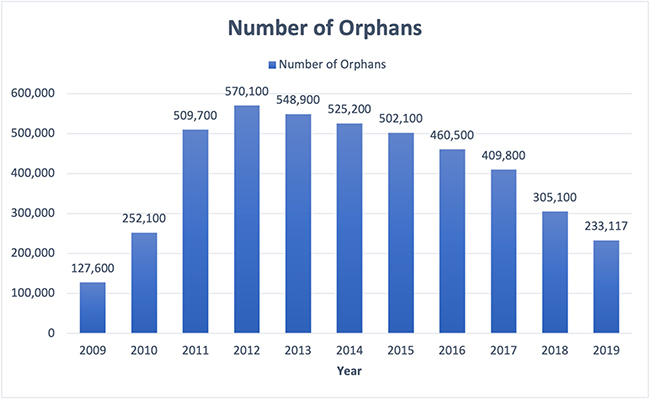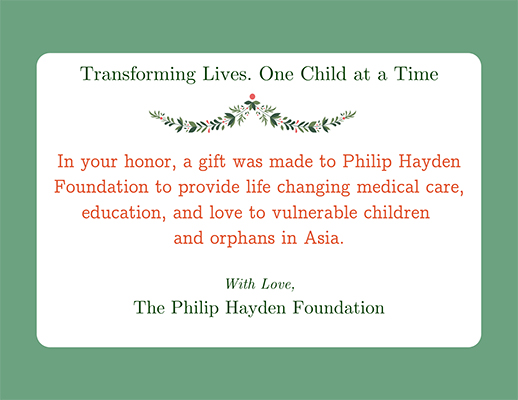From the Heart
By Lily Zhuang
With the continuous improvement of China’s economic and social development and enhanced welfare level, fewer children are abandoned. As a result, the number of orphans in China has dropped for seven consecutive years.
Looking back to Chinese New Year in 2014, I remembered something that Tim Baker said during a staff meeting after he returned from Guiyang, where his first daughter was adopted from. He said: “What we’re doing is working to lose our jobs. If one day there are no orphans in China, we’ll have nothing to do and that will be the best day ever.”
The number of orphans in China began to decline in 2012, and now – nine years later – most of the Social Welfare Institutes (SWIs) have enough resources to provide a good life for the daily care of the remaining orphans, including education and therapy. Even though the demand for foster homes has dropped throughout China, we haven’t lost our jobs just yet. There are actual orphans waiting for us to go to them, to go to the underdeveloped places where they live, and to go show them there’s hope for a better life.

Unsupported Children – the New Challenge
Starting in 2020, the government put more resources into unsupported children, or de facto orphans. China has defined an orphan as a child whose parents are deceased or cannot be found. Jointly issued by the Ministry of Civil Affairs, the Supreme People’s Court and 10 other departments, the guideline defined de facto orphans as children with both parents serving prison terms, undergoing compulsory drug rehabilitation or restriction of personal freedom as legitimate orphans. This puts them in the same category as children who have sick, disabled parents or parents who have been declared missing or deceased. A child is unsupported even if only one of a child’s parents has restricted personal freedom and the other parent is dead or missing. The children of migrant workers left behind in the care of extended family are also considered unsupported children.
Since adoption is becoming more difficult due to Covid19, coupled with the fact that most orphans have special needs, we’ve been looking for better ways to help vulnerable children and orphans from all backgrounds and situations.
At the end of September, I visited a social workstation founded by an enterprising nurse and her sisters. When caring people like these three sisters spread a little faith and love to orphaned children, it sets an example for the entire nation. Along with the renewed effort by the government to support destitute children from all circumstances and backgrounds, this seems like a good model to follow. Thank you for your prayers and support as we work together to “put ourselves out of a job.”
Orphans in Rural Asia Need Help
Orphan care in urban areas has improved dramatically over the past decade. State orphanages were renovated or new ones built. Besides increased access to medical care and therapy, more caregivers have been trained to provide specialized care to orphans with disabilities. This is important because 98% of orphans in China have disabilities. But orphan care improvement in rural areas still falls behind.
Two thirds of Chinese citizens live in urban areas and most enjoy great economic freedom. There are also more therapy centers and specialized education for children with disabilities in urban areas. While income has also increased in rural areas, it is far lower than in urban areas. In fact, the average income in a rural area is only one third of the average income in an urban area. While only a third of Chinese citizens live in rural areas, 80% of children with disabilities live in rural areas.
Orphans In Rural China Affected by Poverty
The next horizon for helping at-risk children and orphans is in rural areas, where poverty is high, and resources are limited. Beyond helping orphans, there is a need to help unsupported children and to provide resources to families so that they can keep their children.
In one such community, a compassionate nurse and her sisters began caring for the sick, elderly, and orphans. The three women help operate the local orphanage – as well as multiple children’s centers – that accept all orphans, including unsupported children. The local Ministry of Civil Affairs provides buildings and the basic infrastructure, and the sisters oversee the operation and personnel. In some villages, they’ve repurposed old churches into Children’s Centers and trained the former church workers as Social Workers. The three sisters report that things are going well, but the need is great.
Orphan Care in Rural Asia
Trusted friends have had direct contact with this ad hoc foster home for more than a decade. The director has a passion for loving and caring for the vulnerable children in her community. Sadly, the allocated funds from the local government are not sufficient to meet the basic needs of the orphans. Your donations will help provide formula and diapers as well as increase the number of workers. Children with disabilities need more time from a caregiver than a child without disabilities. The local schools do not yet have specialized education, and some children have medical needs not covered by the China Center for Child Welfare and Adoption (CCCWA).
Right now, there is a monthly shortfall of thousands of dollars to meet the basic needs of the orphans in this community. With your donation, you can make a difference in the lives of these orphans today, One at a Time in Asia.
Privacy Requirements
Information and photos of these children can only be shared in print and through email. An English name will be assigned to help you get to know the children you help. Please do not post any information online or forward any emails.
You can sign up to receive continuing information about this project by email and share the link with your community.
Stories of Children in Need
This rural welfare workstation cares for more than 60 children with a variety of needs. Some are orphans, and some are unsupported children. Many of the caregivers are volunteers, lovingly caring for each child. Because privacy is important, we will only introduce 4 children. Your donations will help not only these children, but their friends with similar needs.
Severe Medical Need
Owen was born with severe medical needs and professionals did not see a possibility for improvement. His current condition calls for a special formula that will keep his weight up and to provide the nutrients his body needs. He has a tumor on his spine that is inoperable so the caretakers are trying their best to make him as comfortable as possible. There is limited space and staff so he can’t always get what he requires. Because Owen doesn’t need surgery, funds often go to the children that do.
Cerebral Palsy
Elijah has cerebral palsy, but that does not slow him down. When Elijah was six years old, he liked listening to music and dancing with his caretakers and that hasn’t changed! Now as a nine year old, Elijah works with his caretakers three times a week to improve his strength and mobility. His favorite activities are playing with clay, throwing and catching a ball and tracing shapes on the white board. He attends preschool and is making great strides with reading and basic math. Elijah will not need any surgeries, but he needs physical and occupational therapy in order to thrive.
Hemiplegia
Clara was born with hemiplegia on her left side, including hands and feet. This has impacted her mobility and at twelve years old, she would like to feel more independent. Due to her age she worries about living arrangements and her future ability to provide for herself. Clara would benefit from a mobility aid and physical therapy to build strength on her left side.
Autism
When we met Dominic, our caregivers noticed traits that are often related to Autism. Because of this diagnosis they have learned how to care for him in the best way possible. Dominic would benefit greatly from therapy, but it is not available. He is sensitive to certain textures and this has made it difficult for caregivers due to limited resources. He does not like crunchy foods, but most of the soft foods are given to the younger children because of a limited supply. Dominic has trouble participating in school, but there aren’t enough caregivers for him to receive individual assistance. He would benefit from stim toys – toys that help with self regulation – when he becomes overstimulated, but they are not available because of limited resources.
Burns
Elaine is seven years old and was burned severely in her family home. Her parents did not have the resources to provide the care she required, so they asked for help. Elaine needed shelter and the ability to feel safe in her environment. Her injuries call for continued medical attention to prevent infection and severe scarring.


Donate in Honor of a Loved One
Are you looking for a lasting gift to honor someone? Now you can choose to give a tribute gift through Philip Hayden Foundation. With a minimum gift of $15, we will mail a personalized card to the recipient – or to you so that you can add your personal note. Just check the box for making a gift in honor of someone and follow the on-screen instructions. You can also mail a check to Philip Hayden Foundation, 40335 Winchester RD #E-115, Temecula, CA 92591. Please include a note with the recipients contact information.
If you’d rather have us send an email, just provide an email address and we will take care of the rest. We will not add your recipient to our mailing or emailing lists.
Year End Planning
Have you moved? Prefer to receive your year-end contribution statement by email? Email Lori.Baxter@chinaorphans.org and let me know! Statements are sent out the third week in January by mail. Update your records now by visiting our self service portal at chinaorphans.org/contact-us. You will need to provide your email address to log in. You can even check your donation history while you are logged in!
If you prefer, call Lori at PHF at 866-526-3712 or email her directly. Your donations make a difference in the life of an orphan in China.
Access Your Account Online
Great News! We have updated our online donation system, and you now can access your account online. For your security, you will need to request access through a link on our website here. You’ll be asked to provide your email address, and a link will be sent to you. For your security, that link is only good for 24 hours. But you can access your account as often as you want.
Use your self-service page to:
- Update your physical address
- Update your email address
- Change your online donations
- View your donation history
- Print receipts for past donations
If you have any questions, please email Lori.Baxter@chinaorphans.org.

